All posts by Andrew Wesley/h3>
While many will have spent the summer having holidays and day trips out with the family, our solicitors and police station representatives at our Chesterfield office have been taking their own day trips out of the town to provide legal advice and representation.
Unfortunately, these have not been to the seaside to enjoy an ice cream but to ensure that our clients who live local to Chesterfield receive advice and representation from lawyers that they know and trust. We often a nationwide service at both the police station and courts.
Countrywide legal advice and representation
The following are amongst the places recently visited by staff from our Chesterfield offices:
- Buxton Police Station
- Harrogate Police Station
- York Magistrates Court
- Manchester Magistrates Court
- Staines Magistrates Court
- Sheffield Magistrates’ Court
- Boston Magistrates Court
- Lincoln Crown Court
All of our Clients involved in the police investigations or cases before these courts had links to the Chesterfield area.
Their first priority was to have a solicitor local to them for ease of providing instructions rather than local to the police station or court they had to attend. They wished VHS Fletchers solicitors to deal with their case on the basis of previous dealings with our expert criminal solicitors or because they had been referred to us.
It was important to them to have a solicitor or accredited police station representative that they could trust.
When we were contacted by these clients we were only too happy to travel to provide them with the service that they wished. Our clients faced a range of offences, including
- assault
- theft
- criminal damage
- breach of court orders
Advice on your case under the legal aid scheme
As we have a contract with the government to permit us to provide expert legal advice and representation under the legal aid scheme. This means that our advice in the police station will always be free of charge to you in the police station.
There are many advantages to seeking advice in the police station and you can read about those here.
Many of our clients will be also be entitled to legal aid in the Magistrates’ Court. Nearly all will be eligible for legal aid to ensure representation for cases before the Crown Court.
You can read more about these types of legal aid here.
In the cases at the police station or the courts set out above, all of our clients had the benefit of free legal advice.
Instruct criminal defence solicitors who will go the extra mile for you
You may choose your solicitor by reputation. You might want to choose a solicitor with an office near to where you live, no matter where your case will be heard.
If you require the assistance of a firm of expert criminal defence solicitors who are more than happy to travel to provide you with nationwide criminal advice and representation, then look no further than VHS Fletchers.
We will go that extra mile (or if need be the hundreds of extra miles) needed to ensure that you get the best outcome possible.
Read more about the benefits of instructing our solicitors and litigators here.
You can contact our Chesterfield office for emergency advice day or night, 365 days a year on 01246 387999.
Alternatively you can use the form below.









